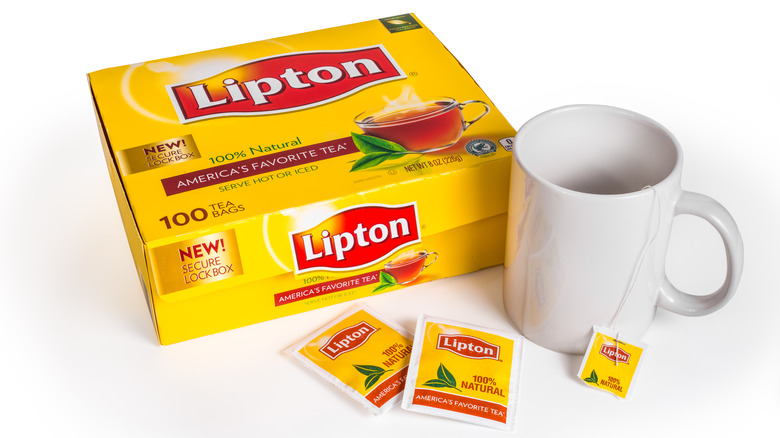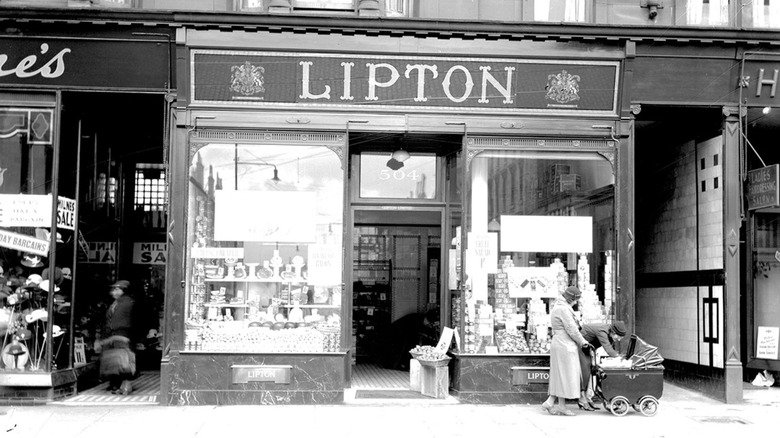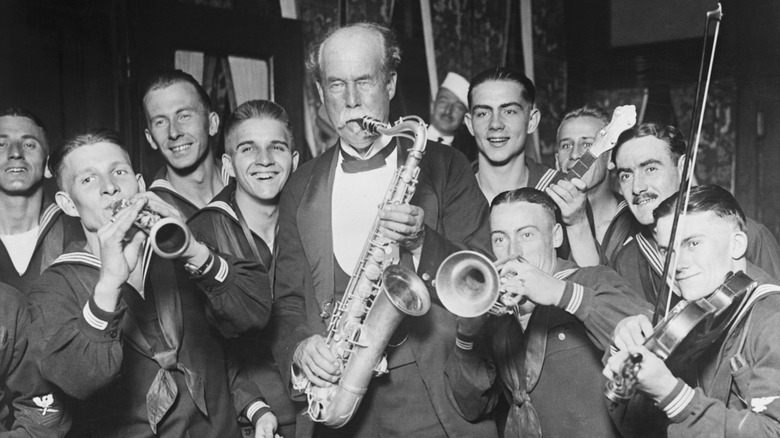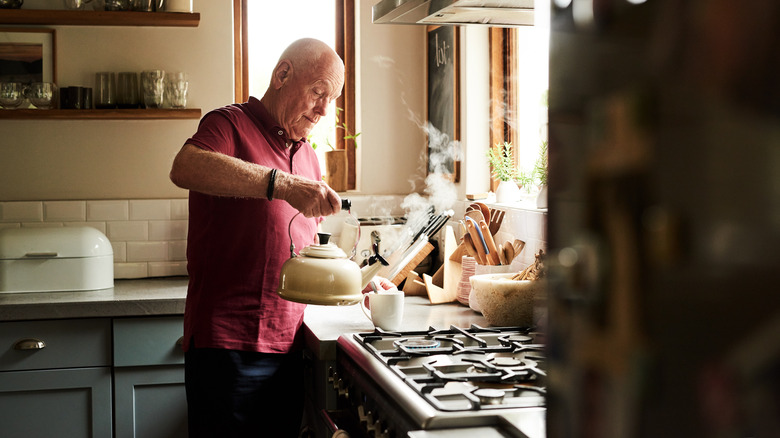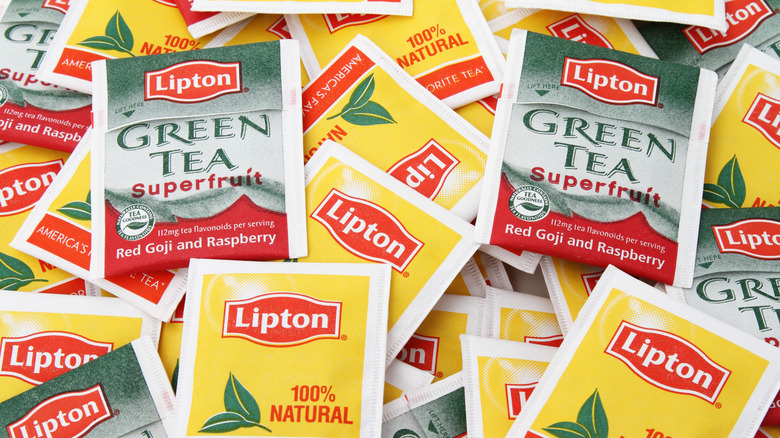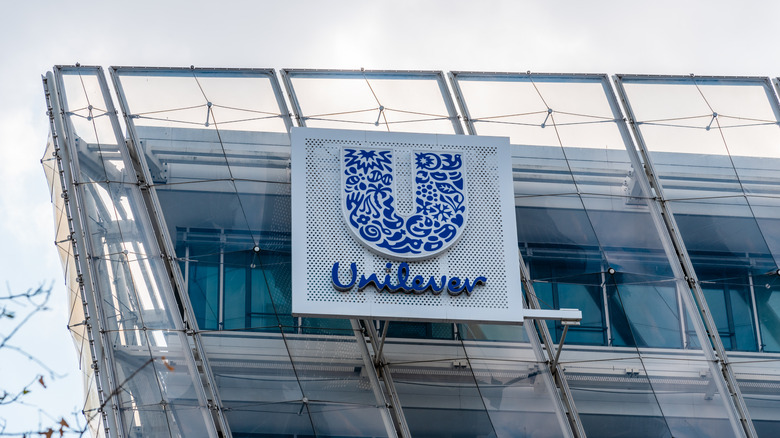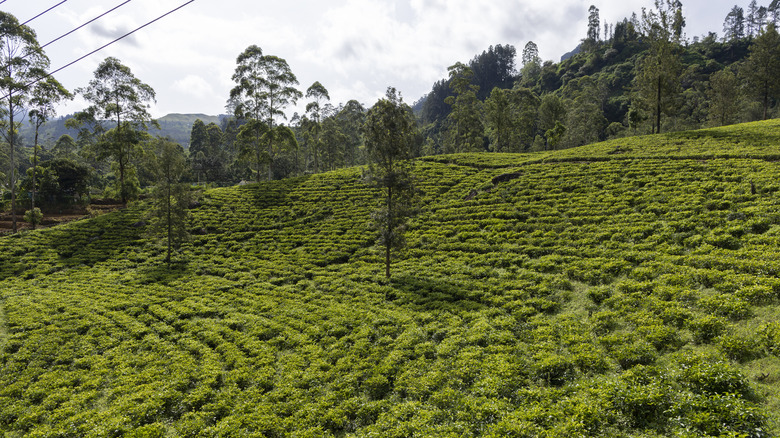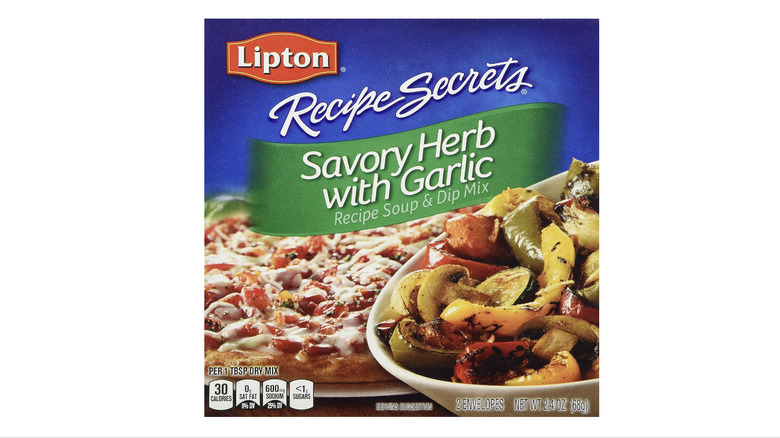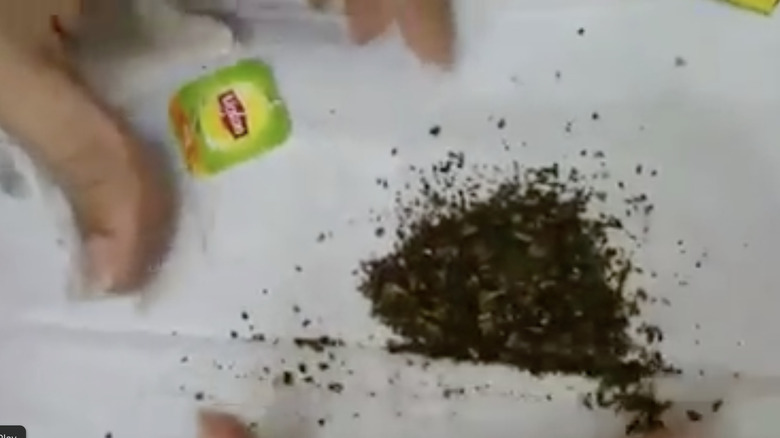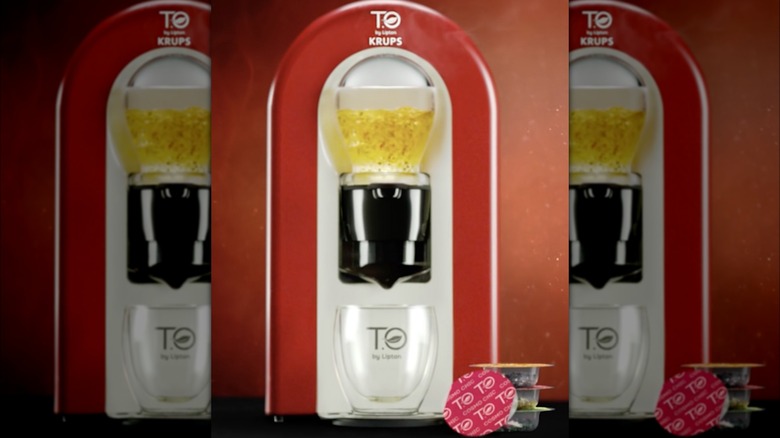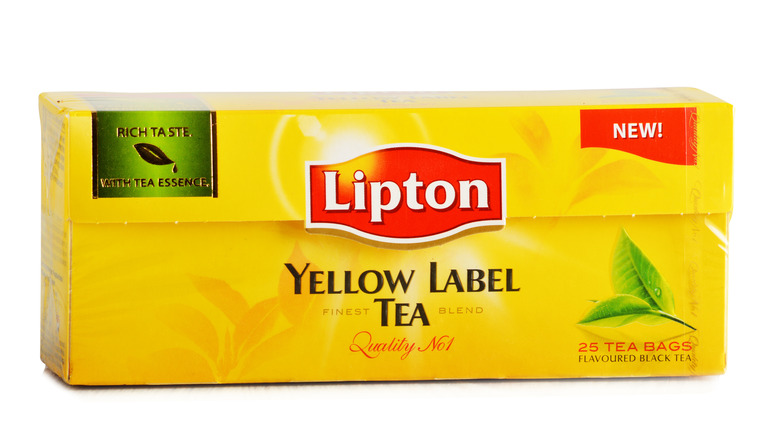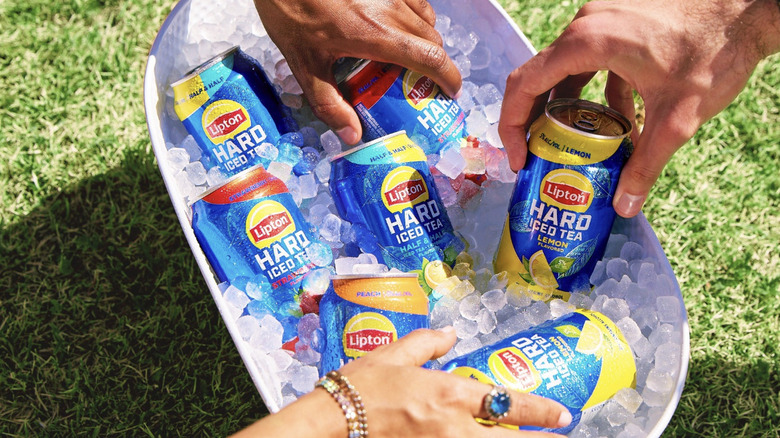Lipton: 11 Facts Tea Drinkers Need To Know About The Brand
We may receive a commission on purchases made from links.
Tea has come a long way since the 17th century when it was considered to be bad for health in parts of Europe on account of being hot and caffeinated. Today, tea is the most widely consumed beverage after water — a staggering three billion cups of the beverage are drunk around the globe every day, and the U.S. is no exception. Each day, more than 159 million Americans enjoy a refreshing cup of tea, as reported by the Tea Association of the U.S.A. That's almost half of the entire population of the country!
Founded by Thomas Lipton in the late 19th century, Lipton has played a pivotal role in shaping the global tea industry. Over 150 years ago, Thomas set out to make tea accessible to the masses and he succeeded. Lipton is sold in more than 150 countries around the globe, offering a huge range of variants from classic black tea to herbal tea infusions with ingredients such as turmeric, dandelion, and lavender. The brand also sells a range of iced teas (including alcoholic options) and even soup mixes.
As Lipton continues to evolve and adapt to the changing preferences of consumers, it remains a symbol of quality in the tea industry. However, as well as you may think you know the brand, there are always new revelations just waiting to be uncovered. Here are the 11 facts tea drinkers need to know about the popular brand.
1. Lipton started out as a store
The founder of Lipton, Thomas Lipton, was pretty resourceful from a young age. Born in Glasgow, Scotland, it didn't take Thomas long to expand his wings. At just 16, the young man left his home country for the U.S. where he worked numerous jobs before returning to his homeland. It's here that he started selling tea at his parent's grocery store. The venture did exceptionally well, and it didn't take Thomas long to transform the solitary store into a chain of Lipton stores across Glasgow. The Lipton Tea brand was born in 1871 as a product sold in the stores.
In 1890, in an effort to bypass the middleman, Thomas booked his passage to Ceylon (modern-day Sri Lanka) to investigate the tea trade firsthand. He eventually ended up buying multiple tea farms in the country where he planted and harvested his own produce. It was also around this time that Thomas founded the Thomas J Lipton Co. tea packaging company in New Jersey. Despite a rumor that Thomas would start planting tea in the States that hit the newspaper headlines in 1888, Lipton didn't venture into tea cultivation in the States until 1963 when The Charleston Tea Plantation opened on Wadmalaw Island, south of Charleston.
2. Lipton already ran innovative marketing campaigns way back when
When it came to product promotion, Thomas Lipton was ahead of his time. Before becoming a tea mogul, Thomas sold dairy products. To market his goods, Thomas commissioned Jumbo, a 3,500-pound cheese wheel, to be shipped from the U.S. to Glasgow. Scores of spectators lined the Glasgow docks and the surrounding streets, eagerly anticipating the arrival of the cheese. When Jumbo was cut into pieces, it became apparent that the wheel was filled with coins, prompting a frenzied response from the crowd that necessitated police intervention. The spectacle proved so popular that Thomas decided to hold it each year at Christmas time.
Despite growing tea on plantations in Ceylon, Thomas liked to be perceived as locally based, advertising his product with the slogan, "Direct from the tea gardens to the teapot." Never mind the fact that the tea had to be shipped thousands of miles to reach its consumers. Always the showman, Thomas marked the arrival of the first shipment of tea from Ceylon by commissioning a brass band and holding a bagpipe parade. At one stage, he also introduced "Lipton Currency Notes" as a promotional stunt for his business.
3. Lipton made tea affordable
Before Lipton, tea was typically enjoyed by the upper classes in Europe and the U.S. While tea was popular in the late 1800s, Britain's lower-income workers often simply couldn't afford it. Looking for new business opportunities, Thomas Lipton saw the potential in making tea more accessible to the general population. More specifically, he believed that if he could offer decent quality tea at affordable prices, he would be able to create a whole new market for his product.
Thomas came up with a strategy — if he could cut out the middleman, he would be able to lower the price of tea. By setting up his own tea plantations in Ceylon, Thomas envisioned that he would be able to reduce the price of the product and make it more widely accessible. Thomas also started selling tea in quarter-, half-, and full-pound packages, allowing his customers to know exactly what they were getting for their money.
The author of "A Full Cup: Sir Thomas Lipton's Extraordinary Life and His Quest for the America's Cup," Michael D'Antonio, once told NPR in an interview, "[Thomas] really developed the first consistent brand of tea that was the same from package to package, from location to location, every time you bought it. And he priced it at half the price of other manufacturers so it was a runaway hit."
4. Lipton was one of the first companies to sell tea bags
Lipton is often said to have been the first tea company to start selling its product in tea bags in the early 1950s (this claim, however, is dubious since tea bags were already in use in the U.S. in the 1920s). The more likely claim is that Lipton was the first tea brand to introduce brewing instructions on its tea bag tags. Surprisingly, Lipton's tea bags haven't changed much over the years in terms of design and content, as explained by Lipton Tea Master, John Cheetham. "The amount of black tea that Lipton uses in a tea bag has stayed the same since the 'flo-thru' bag was introduced in 1952," he said in an interview with Time.
While Thomas Lipton wasn't the inventor of the tea bag, some attribute the development of the tea bag to another Thomas — an American tea merchant called Thomas Sullivan. According to the story, Sullivan sent samples of his tea in silk bags in 1908. While he never imagined that his customers would put the pouches directly in hot water, they did just this. The new brewing method was a hit, and tea lovers were soon asking for more tea bags. Another pair of inventors credited with contributing to the development of the modern tea bag are Roberta C. Lawson and Mary Molaren. In 1901, the duo patented a "tea leaf holder" that used mesh fabric to keep tea leaves from mixing with water.
5. Lipton sparked a collaboration between Unilever and PepsiCo
This is probably not going to come as a surprise — Lipton is no longer owned by the Lipton family. In a world where corporate mergers and acquisitions are commonplace, it's hardly shocking that a global conglomerate took control of this iconic tea brand. More specifically, Lipton International was purchased by Unilever in 1971, making the company the world's top distributor of ready-to-drink tea.
It wasn't until 1991 that PepsiCo joined the party, creating the North-American Pepsi Lipton Tea Partnership. The 50/50 joint venture evolved in 2003 with the creation of Pepsi Lipton International, which sold Lipton tea in more than 40 countries. The expansion targeted existing Lipton markets, such as Thailand, Singapore, Australia, Spain, and Brazil, as well as uncharted grounds. At the time, the Director of Unilever Foods Division, Patrick Cescau, was reported as saying, "We have a strong presence in the developing and emerging markets, yet there is plenty of 'white space' to move into. These markets are the next in our planned rollout and we see Pepsi as the best partner to help us achieve this" (via Chief Marketer).
6. Lipton has been certified by the Rainforest Alliance
All Lipton tea is Rainforest Alliance Certified to ensure that future generations of tea lovers can also enjoy its brews. The certification means that Lipton is committed to the sustainable production of its products in three key areas: environmental, social, and economic. The Rainforest Alliance only awards its certification once farmers that supply goods to a company have been independently assessed against the three pillars.
Lipton has committed to sourcing its tea in a sustainable way that doesn't negatively affect the environment. Some of Lipton's pledges have included reducing the use of pesticides whenever possible and promoting more sustainable farming techniques. In 2009, Lipton's work with the Rainforest Alliance earned the company a Corporate Green Globe Award.
When Lipton first announced its partnership with the Rainforest Alliance back in 2007, Unilever's CEO at the time, Patrick Cescau, explained the move in a press release: "This decision will transform the tea industry, which has been suffering for many years from oversupply and underperformance. It will not be achieved overnight, but we are committed to doing it because we believe it is the right thing to do ..."
7. Lipton produces soup mixes
While Lipton is widely recognized for its tea, it's a lesser-known fact that the brand also manufactures dried soup mixes. When it comes to soup, Lipton is no one-trick pony. The brand offers 14 different soup types, from a chicken noodle soup mix to an onion mushroom mix that functions as both a soup and a dip. Many of the products can be used either as soups or a seasoning mix for meatloaves, roasted veggies, and other dishes.
One of the fan favorite Lipton soup options is the savory herb and garlic recipe. In fact, this product has proven to be so popular with online shoppers that it has received a high rating of 4.6 out of 5 stars from Amazon shoppers. One reviewer says that the product "adds lots of flavor," elaborating, "I use this on my turkey breast, pork roast, and chicken that I either cook in the crockpot or oven! Also use some in my beef stew, it is delicious!" The only gripe that customers seem to have with the product is that it's sometimes tricky to find on supermarket shelves.
8. Lipton was once accused of producing worm-infested tea bags
In 2016, a video appeared on Facebook that allegedly showed "worms" in Lipton's Lemon Green Tea bags. The video, which ended up going viral, depicted a woman opening up a tea bag only to discover the so-called worms. As the social media user examined the content, she commented, "There are worms inside, living worms and it is not one or two, you can see a lot of [them]" (via ABC News).
Lipton tried to save face by debunking the video with its own social media clip, clarifying, "There are no 'worms' in our tea bags. These are small lemon flavor pieces, which have been mistaken for worms. The tea is of the highest quality standard and is absolutely safe to consume." More specifically, the clip showed that the so-called worms, or lemon pieces, dissolved upon contact with hot water. Lipton also offered its email address and phone number for anybody still concerned about the issue.
9. There was a Lipton tea machine
Coffee capsule systems are all the rage these days. As such, it's not surprising that Lipton tried to get in on the action with its own version of a single-serve brewing machine. In 2015, the company unveiled its new tea brewing system called T.O. by Lipton. The T.O. by Lipton was the result of a collaboration between the tea brand and a French company called Krups. While the machine automatically determined the best infusion time for each cup of tea, this could also be manually tweaked to cater to individual taste preferences, adding versatility to the product.
The visually appealing gadget came with a transparent capsule compartment for tea leaves and an infusion chamber. The unit dispensed the tea leaves and agitated them to ensure a full-bodied and flavorful infusion. The machines seemed to have fizzled and are no longer available for purchase. Today, Lipton offers tea K-cup pods that can be used with a Keurig machine.
10. Lipton once broke a Guinness World Record
In 2015, Lipton secured the Guinness World Record title for the largest iced tea. To celebrate its 125th anniversary, the brand set up a 12.5-foot-tall pitcher of tea at the Be More Tea Festival in North Charleston, South Carolina. The preparation of the 2,204 gallons of iced tea required eight massive bags of Lipton tea leaves, each measuring 2x3 feet. The entire process took 25 hours and thousands of pounds of ice were used to keep the tea chilled throughout the day.
Lipton's world record was short-lived, however. In 2016, Summerville in South Carolina reclaimed the record for the largest iced tea by filling a huge Mason jar with 2,524 gallons of iced tea. The town previously broke Chick-fil-A's 2010 record for a 912-gallon iced tea by creating a 1,452-gallon equivalent. Since Summerville is the self-proclaimed "Birthplace of Sweet tea," the 2016 record-breaking concoction contained not just 210 pounds of tea leaves but also 1,700 pounds of sugar. Notably, the town of Summerville also has a "Sweet Tea Trail," which offers visitors the opportunity to stop at various shops and sample their sweet tea.
11. Lipton makes alcoholic iced tea
Iced tea has been around for a while. While the refreshing beverage was popularized at the 1904 World's Fair in St. Louis, its documented history in the U.S. goes back to the 19th century when it was enjoyed in the South on hot summer days. Today, 75–80% of the tea drank in the U.S. is iced tea, as reported by the Tea Association of the U.S.A.
Alcoholic iced tea is a much more recent phenomenon. For instance, Lipton's Hard Iced Tea was only introduced in April of 2023. Made with brewed tea, triple-filtered malt, and natural flavors, the beverage is currently available in four flavors, including lemon, strawberry, peach, and half & half (half Lipton tea and half lemonade flavor). The Brand Director for Lipton Hard Iced Tea, Lisa Texido, explained the inspiration behind the boozy beverage in a press release, saying, "We created the recipe to make sure that the smooth, balanced flavor people love about Lipton iced tea really came through. I think people will be surprised that a hard iced tea can be this delicious — it's a must-try."
